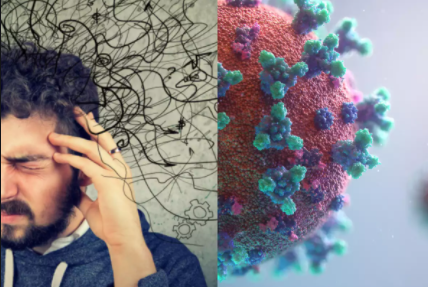COVID-19: Recent Findings Show One-Third COVID-19 Patients Have Problems with Brain Function

Image Courtesy: Times of India
As the COVID-19 pandemic progresses, new findings and knowledge about the disease and the virus emerge rapidly. A recent study found that one-third of COVID-19 patients have issues in brain function, especially in the region called the frontal lobe. The finding, which highlights the neurological underpinnings of the disease, was published in the peer-reviewed journal Seizure: European Journal of Epilepsy.
The study analysed 84 reports published in various journals about the EEG (Electro encephalogram: used to record electrical activity of the brain) recording of COVID-19 patients. The previously published reports said that the patients’ EEG reports showedabnormalities in the frontal lobe of the brain. The current study analysed all the reports and found out what was common in the cases.
The motive behind the large review study was to look into whether the connection of abnormalities in brain function to COVID-19 was co-incidental or a generic trend. Zulfi Haneef, an author of the study, reportedly said: “We found more than 600 patients that were affected in this way. Before, when we saw this in small groups we weren’t sure if this was just a coincidence, but now we can confidently say there is a connection.”
Patients who were advised to have EEG records done showed a slowed response to stimuli and had seizure-like episodes along with speech problems, confusion or an inability to wake up after sedation.
The EEG technique records electrical activity of parts of the brain. It takes advantage of the fact that any brain function is based on electrical signals transmitted by brain cells or neurons. For a particular task, say reading a passage, a number of neurons are involved. They display a pattern of synchronous transmission of electrical signals. An EEG machine can record such patterns. Similarly, there are characteristic electrical patterns associated with regions of the brain which carry out specific tasks. The machine can detect abnormalities in such signals which come from a particular part of the brain.
What the review study found as a pattern in the EEG records was a slow or abnormal electrical discharge, mostly in the frontal lobe of the patients.
The other interesting finding reported by the study reported was that the average age of affected patients was 61 years, with one-third female and two-thirds of the patients males. It is suggestive that brain abnormalities in COVID-19 patients are more prevalent in older males.
According to Zulfi Haneef, the frontal lobe, which is located next to the entry point of the SARS-CoV-2 virus – the nose – might be more accessible to the virus.
Findings of this kind hint towards certain long-lasting effects that the disease might leave in some patients. The long term effects of COVID-19 have been issues with much speculation during the initial phase of the pandemic. Scientific research is now able to provide the basis for such speculation.
However, more research is needed to for a more precise answer. Haneef also apprehended that abnormal EEG records may not be caused directly by the virus, and these may manifest as a result of some other infections or complications.
Get the latest reports & analysis with people's perspective on Protests, movements & deep analytical videos, discussions of the current affairs in your Telegram app. Subscribe to NewsClick's Telegram channel & get Real-Time updates on stories, as they get published on our website.














